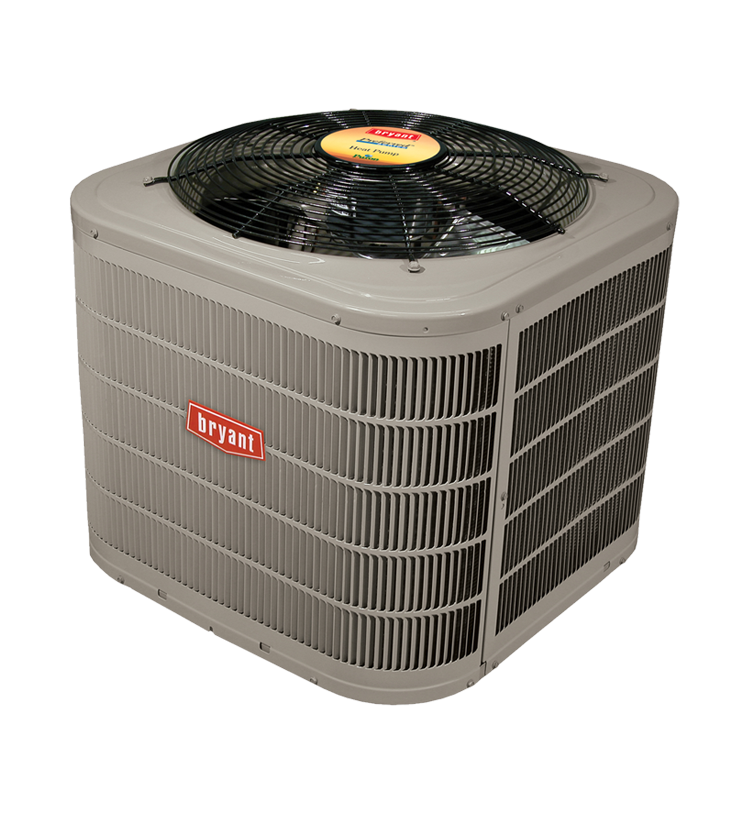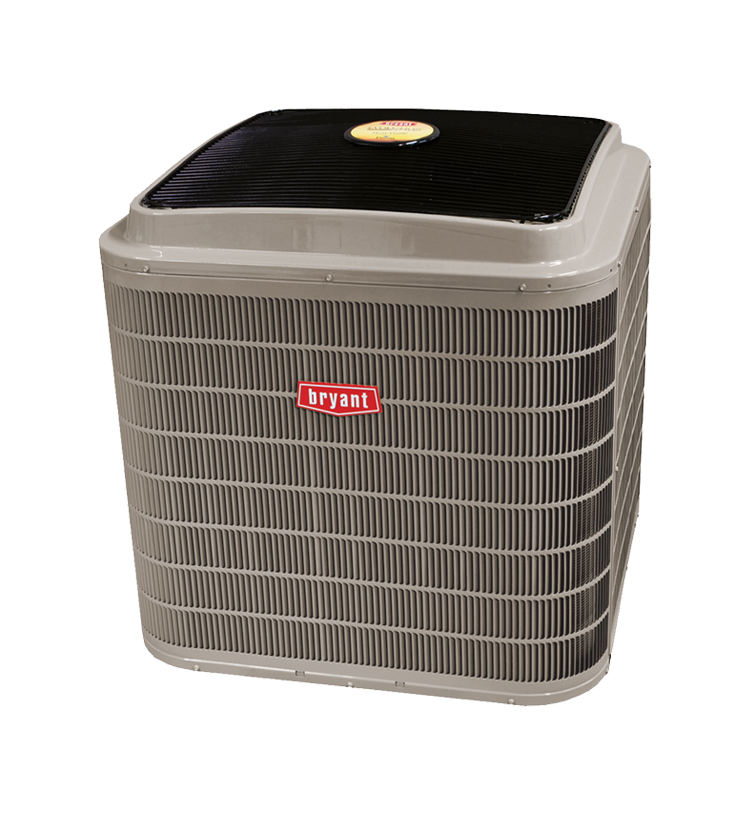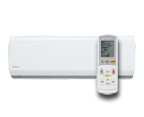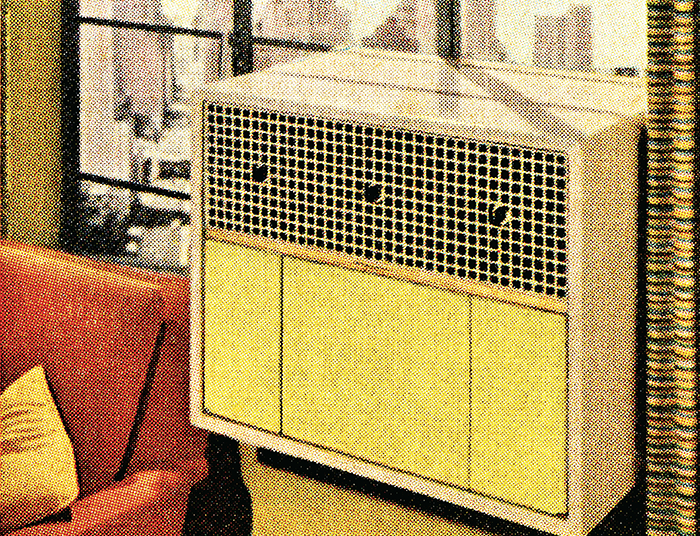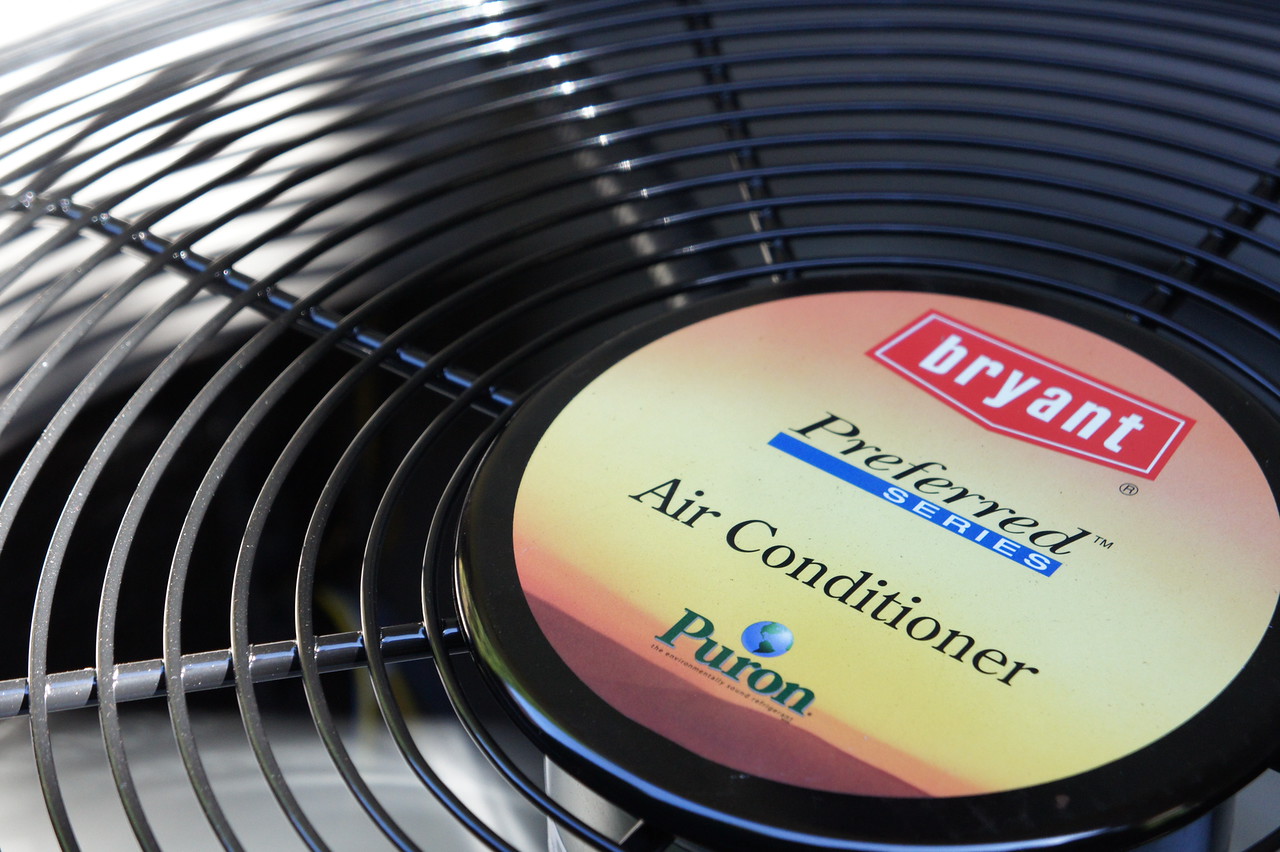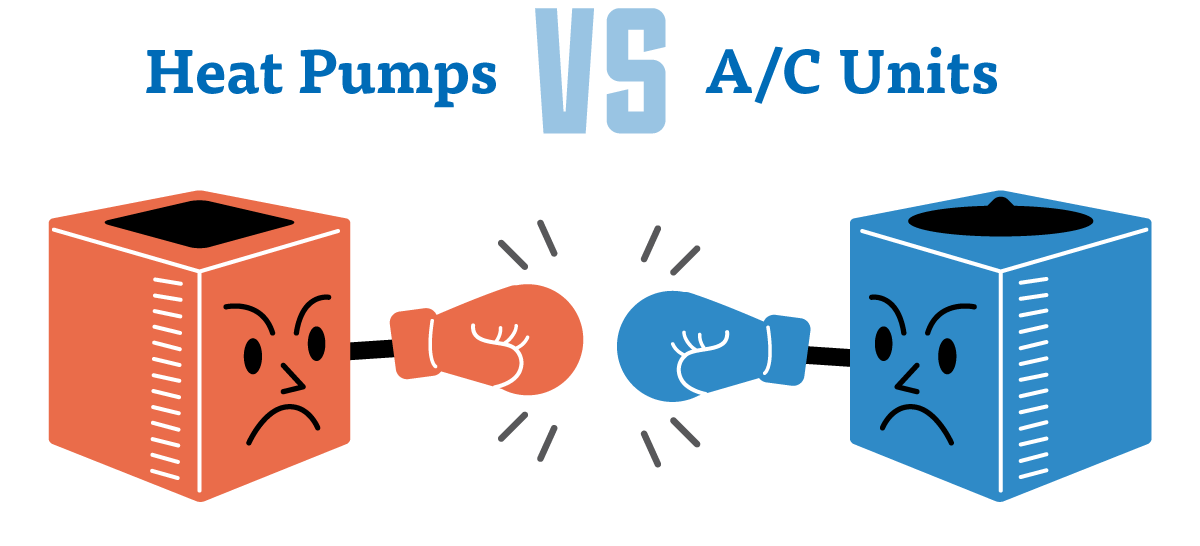
Heat Pumps vs Air Conditioners (A/C): The Cooling Battle!
Let’s get to the cooling battle face-off between central air conditioning, heat pumps and some alternative methods face off.
To start, let’s examine some similarities between heat pumps and air conditioners. Side by side you wouldn’t be able to tell the difference due to their box-like shape and similar height. The similarities don’t end at their physical appearance because they also function in the same way – with one caveat.
Heat pumps are essentially air conditioners and in the summer they cool your home just like an AC unit would. Both systems are powered by outdoor units and use the science of thermal energy to transfer heat in the air from one place to another. The units connect by a line-set charged with eco-friendly refrigerant to a coil that is placed above your furnace.
What’s the caveat then? Winter.
Both HVAC systems work the same to keep your home cool during summer. But an AC unit becomes useless in the winter while a heat pump system thrives (at least in Washington winters with our average outdoor temperatures) with it’s two-in-one ability to also heat your home. Both systems can cool effectively, but the best choice depends on your home’s design, climate, and energy goals. Before making that investment, check out Tacoma HVAC Services to help you pick the right option and install it right the first time.
Still, some homes in Washington prefer AC over a heat pump. Let’s look at why.
Air Conditioning
What is Central Air Conditioning?
An air conditioning system, like your fridge, absorbs heat from air that passes over the coil, and the resulting cool air is moved into your ducts and through your home. The collected heat is expelled through an exhaust process. Okay, there’s more science to it than that, but you get the idea. There are room air conditioners that hang out your window and cool one room and air conditioning systems, aka central air, which is what we are comparing to heat pumps today.
Pros of Air Conditioning
To provide your home with cool air, a central AC unit removes humidity from indoors and transfers it outside. As soon as your thermostat reads warmer temperatures, it signals to the AC system to begin the cooling process. The AC unit begins absorbing the heat and moisture into air ducts where it passes through a filter system that removes airborne particles like dust and lint. This helps improve indoor air quality and reduce allergens by cleaning the air filtering through.
The warm air passes through to the refrigerant which then pushes the heated air outside leaving you with a cooler home. If you’ve ever put your hand on an air conditioner or even been within a foot of one, you’ll notice that it’s very warm to touch. The heat radiating from it is actually the heat it pulled out from the air in your home. Neat huh?
But more than keeping your home consistently cool during hot summer days, AC systems have a variety of benefits including:
- Protection against extreme heat in any climate
- Improve air quality
- Help against allergies
- 10-15 year lifespan
- More budget friendly than heat pumps
- More compact
Cons of Air Conditioning
If a heat pump can heat and cool, why would a home use an air conditioner? And do you really need air conditioning in the Puget Sound where summers are less extreme than other climates?
Great questions. In truth, an air conditioner’s biggest weakness is also arguably its greatest strength depending on the needs of your home. Since an AC system can only cool, it’s limited and your home would need an heating system during the colder months. But because it can only cool, it’s also a specialist which has its advantages as discussed above.
Additionally, central air conditioners aren’t the best at saving energy because of how much energy it consumes to cool a home. And this can have quite the impact on your utility bill.
To summarize, the cons of an AC unit are:
- Less energy efficient than a heat pump
- Provides only cooling
- Can be costly
- Needs a heat source
But don’t count air conditioners out just yet! The largest advantage is an air conditioner will give you a cool, comfortable home in the summer with less upfront installation costs than a heat pump. If you already have an energy efficient way to heat your home, such as a high efficiency gas furnace, then perhaps a heat pump will not yield a high enough return on investment. Or, if space is an issue then an air conditioner may be the right choice as they are more compact and fit into tighter spaces.
Heat Pumps
What is a Heat Pump?
A heat pump is a central air HVAC system designed to cool a space when in cooling mode and heat a space through “reverse cycle” in heating mode. The heat pump, just like air conditioning, does not generate cool or warm air but simply moves it around. A heat pump system can keep your home cool by pulling heat and moisture out of your home’s indoor air and releasing it outdoors. But unlike an air conditioning unit, it can do the reverse and heat your home by pulling heat from outside air and releasing inside your home.
This all-in-one feature provides an economical source of heat (the air, it’s free!) and uses much less energy in the process.
Pros of a Heat Pump
The heat pump’s main advantage is it can cool and heat, so you can use it all year round. In fact, our Pacific Northwest mild to moderate climate is one of the most efficient for heat pump operation. Because heat pumps work by using electricity it reduces the need for natural gas or a propane tank.
If your home is currently heated by an inefficient heat source, for example, oil, you’ll see much lower heating costs with a heat pump. The investment could pay for itself on the heating costs alone – and your air conditioning would be free!
Our local Washington utilities offer rebates for heat pumps because of the real energy savings they provide. The heat pump is also one of the ‘greenest’ ways to heat and cool your home because it is powered off of renewable electricity.
To summarize, heat pumps:
- Are highly energy-efficient
- Save $$$ on utility bills
- Are easy to maintain
- Handle your home’s heating and cooling needs all year
- Qualify for tax rebates
- Are environmentally-friendly
Cons of a Heat Pump
As we mentioned before, the differentiating factor between AC and heat pumps is the heat pump’s dual ability to heat the home. And while that benefit may seem like an obvious reason to side with a heat pump, there are some limitations to this as well.
Because heat pumps work year round to keep your home in complete comfort, this also shortens its lifespan. Where an an AC system gets a nice break during the fall and winter seasons, a heat pump continues battling the cold air to warm your home. Like with anything that’s put to constant use, it wears down quicker with an average lifespan of 10 to 12 years versus the 10 to 15 years of an AC unit.
Still, the real achilles heal of a heat pump lies in the climate of a location. In places where temperatures get no lower than 25 degrees, a heat pump is the superior heating system in most cases. So, what if the temperature drops below 25-30 degrees?
For locations that experience freezing winter temperatures for long periods of time, the heat pump will struggle to provide hot air. A heat pump uses the air outside your home and converts it into warm air inside your home. Even in temperatures of 25-35 degrees there is plenty of heat available in the air for the heat pump to extract. But the colder the temperatures become, the less heat there is available, and the harder it will work. Eventually, if the temperature continues to bite, a heat pump will need backup from a secondary heating source such as a gas or electric furnace.
To summarize, heat pumps:
- Have a shorter lifespan
- Struggle in freezing temperatures
- Will need a backup heating system if temperatures fall below freezing
Lucky for us Washingtonians, freezing temperatures aren’t the norm and in HVAC services in Lynnwood, many homeowners switch to heat pumps to avoid installing separate heating and cooling systems, simplifying maintenance and saving space.
What should you choose for your Washington home?
Now that you know the pros and cons of a heat pump and central air conditioning system – how do you choose which one is right for you? There are various factors that can help you determine the best fit.
- Cost: Heat pumps have a more expensive base price but can save you money monthly on your utility bills. Central air conditioners are less expensive upfront, but will cost you more on a monthly basis than a heat pump. That being said air conditioning use in Washington will only be needed for several months out of the entire year.
- Climate: No matter the type of heat pump be it ductless mini split or a geothermal heat pump, they all work perfectly for the mild climates of the PNW. And yet, as we all watch weather across the globe, including in Washington, become more extreme it’s hard to say whether a heat pump will be the best option years down the road.
- Ongoing Maintenance Considerations: Depending on the quality, make and model, both air condition systems and heat pumps can be relatively low maintenance. However, AC units tend to be less expensive to maintain and operate due to being in use much less of the time.
- Energy Efficiency: Heat pumps are more energy efficient than central air conditioners which is why they can also qualify you for rebates. Both measure efficiency using SEER (seasonal energy efficiency ratio) so a heat pump and ac unit with the same SEER rating use equal amounts of energy to cool homes under ideal conditions. However, fluctuating temperatures can tip the favor in either direction. In the summer, a heat pump can handle extreme heat at a lower energy level than an air conditioner. But in the winter, they can use up more energy during extreme cold temperatures than a furnace.
- Life Expectancy: Since heat pumps work year round their lifespan is shorter than that of an air conditioning system. But, not by much. With annual maintenance both will live to fight for your optimal comfort for years to come.
Have questions or ready to choose your cooling system? Give us a call at 800-398-4663 to speak with a home project advisor or get a free estimate today. And if you’re curious about strategies to stay comfortable during the hottest months, see our post 5 Ways to Beat the Heat Wave for tips on efficient cooling, shading, ventilation, and more.
Alternative Options
There are also other options out there. Ductless heat pumps can provide super-efficient cooling and heating to homes with no or insufficient ductwork. A ductless heat pump can lower energy costs 25-40% when replacing electric baseboard heat. If you are an electrically heated home, chances are your utility is offering $800-$1200 rebates on these units. They are great for combined heating/cooling for the whole house or just for one room. Another option for a lot less money is a Solar Attic fan. These will use solar power to run a whole house fan. They don’t cool off the house per se, but pull the heat right out of the house and reduce upstairs temperatures but as much as eight degrees.
The important thing here is that you do not need to suffer through those hot summer nights and prices can be reasonable to cool down. Washington Energy Services’ home energy specialists can help you choose your best cooling option. Call 800-398-4663 or get a free estimate.
Related products
- AC
- AC Installation
- AC Units
- AFUE
- air conditioner
- air conditioning
- air conditioning maintenance
- air conditioning service
- air conditioning tune-up
- air duct
- air duct cleaning
- air handlers
- air pollution
- Air Purification System
- air purifier
- Air Sealing
- angie's list
- award
- BBB
- BBB Accredited Business
- before and after
- Best air conditioner
- best filters
- best generator
- best water heater
- best window install
- boilers
- bryant
- Bryant AC
- bryant furnace
- bryant heat pump
- clean air
- combi-boiler
- comfort
- contractor
- contractors
- Cooling
- daikin
- deals
- discounts
- DIY
- door replacement
- Door Transformations
- doors
- drafty home
- drain cleaning
- Duct Cleaning
- Duct Cleaning Services
- ductless
- Ductless heat pump
- ductless heat pump. mini-split
- Ductless heat pumps
- ductless heating systems
- ductless installation
- Ducts
- earth day
- eco friendly
- EER
- election
- electrical inspection
- energy
- energy conservation
- energy efficiency
- energy efficiency rebates
- energy efficient home
- energy efficient hvac
- energy efficient HVAC Systems
- energy efficient windows
- energy myths
- energy saving
- energy saving home products
- energy star
- energy tax credit
- environmentally friendly
- exterior doors
- fall
- fall weather
- fiber cement
- filter
- filter change
- financing options
- fireplace
- fireplace insert
- furnace
- furnace filters
- furnace install
- furnace maintenance
- furnace mileage
- furnace problems
- furnace replacement
- furnace service
- furnaces
- gas fireplace
- Gas Fireplace Makeover
- gas furnace
- generators
- going green
- good business practices
- Guardian Maintenance Club
- heat
- heat pump
- heat pump installation
- heat pump maintenance
- heat pump vs ac
- Heat Pumps
- heat pumps maintenance
- heat wave
- Heating
- heating and cooling systems
- Heating Brands
- Heating Control
- Heating equipment
- Heating System Tuneup
- heatwave
- HEPA filter
- history
- holiday
- home
- home buyer
- home energy
- home energy efficiency
- Home energy efficiency solutions
- home exterior
- home heating
- home improvement
- home improvement repair
- home inspection
- home maintenance
- home maintenance checklist
- home performance
- home protection
- home repair
- home safety
- home upgrades
- home value
- home windows
- homeowners
- honeywell
- hot water
- hot water heater
- how to
- HVAC
- HVAC Contractor
- HVAC Contractors
- hvac system
- IAQ
- indoor air quality
- infographic
- install
- install furnace
- insulation
- intellihot
- light bulb
- light bulbs
- mailbag
- maintenance
- membership
- mini-split
- money saving
- navien
- new door installation
- new home
- New homeowner
- new windows
- news
- pacific northwest weather
- patio doors
- pets
- plumbing
- plumbing inspection
- power
- power outages
- precision tune up
- preventative
- Pro Tips
- Programmable Thermostats
- propane
- PSE Energy
- PUD
- Ratings
- rebates
- refund
- REME Halo
- remodeling hacks
- Replacing Heating System
- reputation
- Safe Home Insulation
- sale
- save energy
- Saving money
- scam
- scams
- seattle
- Seattle Weather
- SEER
- service
- services
- Smart thermostat
- smoke
- Solar Attic Fan
- solar power
- spring
- standby generators
- summer
- summer fires
- Summer heat
- Summer home
- super service 2016
- tank water heater
- Tank water heaters
- tankless tune ups
- tankless water heater
- tankless water heaters
- tax rebate
- tips
- tune-up
- upgrade
- upgrade cooling
- upgrade heating
- utility rebates
- Washington Energy
- washington energy services
- water conservation
- Water Heater
- water heater installation
- water heater maintenance
- water heater repair
- water heaters
- weather windows
- Wildfire Season
- wildfire smoke
- window
- window energy efficiency
- window install
- window maintence
- window remodel
- window repair
- window replacement
- windows
- winner
- winter
- Air Conditioning
- Air Purifiers
- Cooling
- Doors
- Ductless heat pump
- Environmental
- Fireplace
- Furnace
- Gas fireplace
- Generators
- Heat pump
- Heating
- Home improvement
- How to
- HVAC
- Indoor Air Quality
- Insulation
- News
- Plumbing
- Rebates
- Seattle
- Service near you
- Siding
- Tank water heaters
- Tankless water heaters
- Tips to save money
- Uncategorized
- Wildfire Season
- Windows
